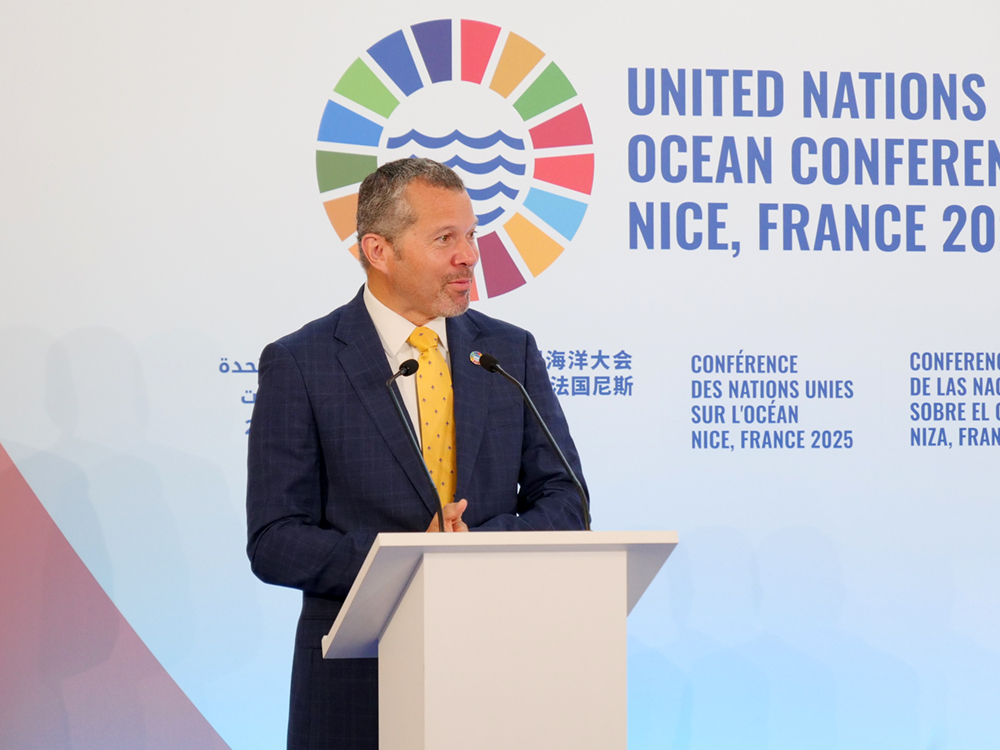IMO Secretary-General welcomes the outcomes of the UN Ocean Conference and urges swift implementation.

"Commitments are a necessary first step, but they are not the finish line." - IMO Secretary-General Arsenio Dominguez at UN Ocean Conference in Nice, France.
The Secretary-General of the International Maritime Organization (IMO), Mr. Arsenio Dominguez has applauded the important commitments made at the United Nations Ocean Conference last week, while urging countries to deliver on these promises as soon as possible.
Mr. Dominguez said: "Commitments are a necessary first step, but they are not the finish line. We must now move beyond the statements and turn those words into real, measurable action. That will take all stakeholders coming together, sharing information, and aligning actions to bridge differences and drive progress."
Mr. Dominguez led an IMO delegation to Nice (9-13 June) to highlight the work being done in the maritime sector to combat marine plastic pollution, protect biodiversity from invasive aquatic species introduced by ships, tackle underwater-radiated noise and decarbonize the maritime sector.
"IMO has a strong, decades-long history of driving regulatory action to protect the marine environment from harmful impacts of shipping, backed by targeted technical support to Member States. We can play a central role in moving this agenda forward," he emphasized.
The outcome document from the UN Ocean Conference recognized the critical role of maritime transport, maritime routes and marine infrastructure in the global economy, trade, food and energy security, as well as the significant challenges of reducing GHG emissions in this sector.
Underwater radiated noise
During the conference, IMO welcomed the launch of the High Ambition Coalition for a Quiet Ocean - a group of 37 countries led by Canada and Panama committed to tackling underwater noise pollution.
An official side event co-organized by IMO with the Governments of France Costa Rica and South Africa highlighted IMO's work on this issue, including:
- Revised Guidelines for the reduction of underwater radiated noise (URN) from commercial shipping adopted in 2023;
- IMO Action Plan on Underwater Radiated Noise adopted in 2024, focusing on developing targets, policies and research, as well as an experience-building phase (EBP) for Member States to share lessons learned from implementing the revised guidelines;
- Technical support to Member States through the GloNoise Partnership Project, currently being implemented by IMO, UNDP and GEF. It supports six countries to develop capacity, raise awareness, establish baselines and advance policy dialogue on underwater radiated noise.
Invasive aquatic species
IMO is actively addressing the threat of invasive species which accumulate on ships' hulls (known as biofouling) and get transferred to new marine ecosystems.
During a side event co-organized by IMO with the Governments of Norway and Fiji, speakers showcased regulatory and technical support actions in this area, including:
- New legally binding global regulatory framework on biofouling management, currently in development for possible adoption in 2027.
- Biofouling guidelines issued to the industry, including the 2023 Guidelines for the control and management of ships' biofouling;
- Technical assistance to support Member States via the TEST Biofouling Project (IMO-NORAD) which promotes the adoption of innovative biofouling management technologies; and the GloFouling Partnerships Project (GEF-UNDP-IMO) supporting the implementation of the IMO Biofouling Guidelines;
- Global Industry Alliance (GIA) for Marine Biosafety, bringing together committed leaders from ocean-based industries to support IMO climate and ocean action via improved biofouling management.
Marine plastic pollution
IMO's International Convention for the Prevention of Pollution from Ships (MARPOL, Annex V) prohibits the discharge into the marine environment of most types of garbage from ships, including plastics, and outlines standards for waste management. The London Convention/Protocol bans deliberate dumping of wastes at sea.
In line with this, the IMO is taking the following initiatives:
- IMO Strategy and 2025 Action Plan to Address Marine Plastic Litter from Ships aims to reduce plastic pollution from vessels, improve port waste facilities, improve awareness and training of seafarers, and strengthen international cooperation;
- Technical assistance provided by the OceanLitter Programme (IMO-FAO) including three key projects - GloLitter, RegLitter and PRO-SEAS. These focus on legal and policy reform to align with international regulations, enhance port reception facilities and advance gear marking systems.
During the Conference, a new Global Industry Alliance was announced for action on marine plastic pollution, with industry actors and members of the private sector invited to join.
Looking ahead
Secretary-General Dominguez urged the international community to ramp up activities and deliver meaningful progress ahead of the next UN Ocean Conference in 2028, to be hosted by Chile and the Republic of Korea.
Links:
IMO at the UN Ocean Conference






